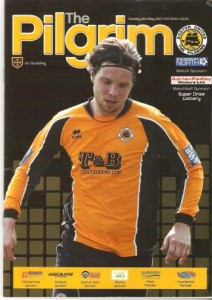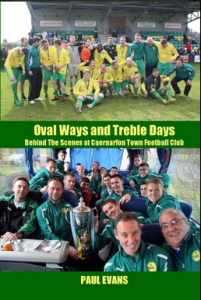Boston United v Guiseley AFC- Sunday 08 May 2011
 Just four years after relegation from the Football League, having lost to Wrexham and then entering Administration on the last day of the season in May 2007, Boston United were on the verge of returning to the Blue Square Premier (BSP) League, the level most Boston fans would tell you is the Lincolnshire club’s natural level. With Lincoln City’s relegation confirmed and Grimsby (poachers of Boston’s successful young management team just days ago) also languishing in the BSP, there was plenty to look forward to, if success in the Play-offs could be achieved.
Just four years after relegation from the Football League, having lost to Wrexham and then entering Administration on the last day of the season in May 2007, Boston United were on the verge of returning to the Blue Square Premier (BSP) League, the level most Boston fans would tell you is the Lincolnshire club’s natural level. With Lincoln City’s relegation confirmed and Grimsby (poachers of Boston’s successful young management team just days ago) also languishing in the BSP, there was plenty to look forward to, if success in the Play-offs could be achieved.
After a tight First Leg, in which Guiseley had gained the advantage through a superb free kick from Warren Peyton from 35 yards, it was all to play for at York Street. Guiseley, who pipped Boston to the Unibond League title just 12 months ago on the last day of the season, and Boston, have been almost inseparable over the past two seasons. This was reflected in this season’s league games which produced a 0-0 draw in Yorkshire on a soggy Tuesday night in November, and a 1-1 at York Street in January.
Ironically for this Yorkshire-based Boston fan, the trip to York Street was considerably longer than the ‘away’ visit to Netherfield, so I was up early and eager to be on my way. Picking up a fellow exile en route, we spent most of the drive down the A1 trying to convince ourselves we weren’t too worried about the outcome – after the last few years and nearly going out of existence the feeling of relief that we still have a club to support is still overwhelming, and after all, we told ourselves, we’d already exceeded expectations for the season. I don’t think either of us was fooled!
On arrival at York Street, the Pilgrims Social Club was rammed, but a pint of Batemans was needed to calm the nerves. With the pre match warm up duly carried out, we took our places amongst the 2,640 strong crowd that had gathered. The famous ‘Town End’ was full of particularly vocal home support and the noise coming from that end of the ground was a good old fashioned racket.
With nerves on edge due to the deficit from the First Leg, it was important that Boston started well, which they duly did. Encouraged by their largest home crowd since their League days, the Pilgrims surged up the pitch, and with 10 minutes gone won a corner. Now it doesn’t take a genius to work out what was going to happen here. Centre back and player of the season Shaun Pearson has scored 11 goals this term, and I’d say 9 of them are identikit headed goals from a corner. I can only assume non-league budgets don’t stretch to scouting or Guiseley would have seen this one coming. From a Jamie Yates corner Pearson thumped one into the net with his head, and sent the crowd ballistic.
From this moment until the half time whistle went, Boston looked the most threatening side, with a shot cleared off the line, and just before half time, an Anthony Church shot struck the crossbar. Guiseley looked happy to make it to half time still in the game, but following a rivalry built up over the last couple of seasons, and particularly after the 1st Leg, in which we had dominated the first half, we knew better than to write them off.
When a minute or so into the second half Church again rattled the crossbar, this time from a free kick, it was beginning to look like we’d carry on where we left off. Guiseley had other ideas, however. When Boston conceded a free kick and our tormentor Peyton was lining it up, there was me thinking ‘oh no, not again’. This one however struck the wall, but it rebounded to former Leeds youngster Gavin Rothery who tucked it past veteran keeper Paul Bastock to put Guiseley back in control of the tie with half an hour to play.
Boston responded to this setback and following a build up of pressure Jamie Yates had a good chance, before Danny Davidson came on as a substitute for the hard working Spencer Wier Daley. Davidson had an immediate impact, creating a chance for Yates that was deflected wide. Then on 79 minutes, from a corner following good play by Ryan Semple, the ball fell to Church, who, having scored our winner in the playoff final against Bradford Park Avenue last season, duly rammed it home to make it the aggregate score 2-2. Cue pandemonium in the stands, and 10 minutes of tension on the pitch, with neither side wanting to make a mistake, the play was very cautious to the final whistle.
With tension in the air, extra time kicked off. The first 15 minutes were tense, edgy times, and few chances were created. Three minutes into the second half came a moment of pure drama as, with Guiseley attacking, Boston were unable to effectively clear their lines and the ball fell to Darryn Stamp who lashed in a volley from 20 yards – a strike worthy of settling any match. The hundred or so Guiseley fans went berserk and a momentary silence settled around the rest of the ground. However this didn’t last long, the United fans, knowing their teams never say die attitude could still sense the possibility of salvation.
That salvation arrived some 5 minutes later as a superb run by the by then almost exhausted Yates resulted in a cross towards the far post where no less that 3 Boston players were lining up to pounce. Danny Davidson was the man in the right place and gleefully headed home. I nearly lost my voice, and my sanity.
For the remaining few minutes of extra time, it was Guiseley who looked shell shocked and Boston piled on the pressure, and almost snatched a winner when Adam Boyes volleyed wide. The final whistle went, and I cannot help but feel if we’d had another 5 minutes we’d have prevailed, but it was not meant to be, and so it went to penalties.
Whilst waiting for the first penalty, I cast my mind back to any situations involving penalty shoot outs where I cared about the outcome. This was the first one I have known involve Boston. All the others involved England so I was certainly prepared for the worst! The next thing that came to mind was how the script was written for our veteran keeper Paul Bastock. A true Boston legend who I remember first watching in the early 90’s, and had returned for the latter part of this season from St Albans to take his appearance total for the club to over 620. Surely if there was to be a hero today it would be him?
Alas, whoever wrote the script must have been from Yorkshire, as the hero turned out to be the aptly named Drench, who, playing in goal for Guiseley, poured water on our hopes by superbly saving an attempt by Gareth Jellyman (yes, he threw a wobbly!) and another effort from Danny Sleath. With Boyes also hitting the post, and Guiseley missing two of theirs , it all came down to that man again, Warren Peyton, who kept his cool and settled 210 minutes of football with one kick, not the best penalty but it in went, setting a date with AFC Telford in the play off final for Guiseley.
Ben Grant

 There are some books you read which you immediately engage with and just can’t put down. Home and Away by Dave Roberts definitely falls into that category. The thing is that there isn’t just one thread within the book that lures you in, but several.
There are some books you read which you immediately engage with and just can’t put down. Home and Away by Dave Roberts definitely falls into that category. The thing is that there isn’t just one thread within the book that lures you in, but several. The title of a book can be a useful device for luring readers in; Oval Ways and Treble Days by Paul Evans being a case in point.
The title of a book can be a useful device for luring readers in; Oval Ways and Treble Days by Paul Evans being a case in point.
 Just four years after relegation from the Football League, having lost to Wrexham and then entering Administration on the last day of the season in May 2007, Boston United were on the verge of returning to the Blue Square Premier (BSP) League, the level most Boston fans would tell you is the Lincolnshire club’s natural level. With Lincoln City’s relegation confirmed and Grimsby (poachers of Boston’s successful young management team just days ago) also languishing in the BSP, there was plenty to look forward to, if success in the Play-offs could be achieved.
Just four years after relegation from the Football League, having lost to Wrexham and then entering Administration on the last day of the season in May 2007, Boston United were on the verge of returning to the Blue Square Premier (BSP) League, the level most Boston fans would tell you is the Lincolnshire club’s natural level. With Lincoln City’s relegation confirmed and Grimsby (poachers of Boston’s successful young management team just days ago) also languishing in the BSP, there was plenty to look forward to, if success in the Play-offs could be achieved.